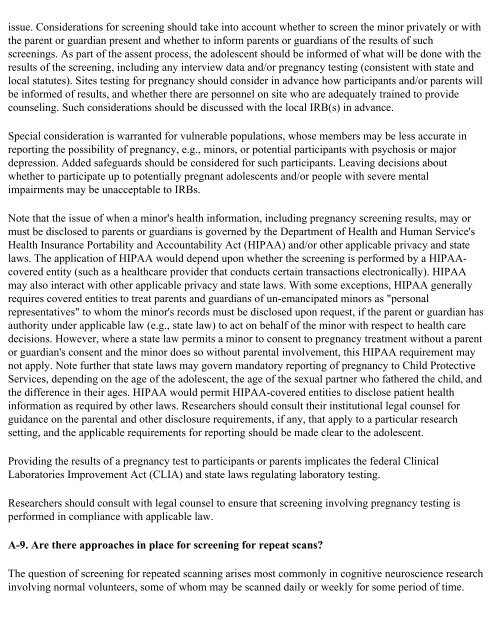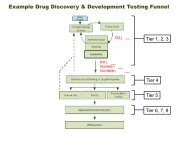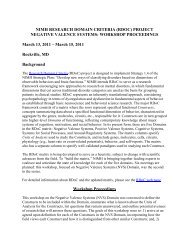MRI Research Safety and Ethics: Points to Consider - NIMH
MRI Research Safety and Ethics: Points to Consider - NIMH
MRI Research Safety and Ethics: Points to Consider - NIMH
You also want an ePaper? Increase the reach of your titles
YUMPU automatically turns print PDFs into web optimized ePapers that Google loves.
issue. <strong>Consider</strong>ations for screening should take in<strong>to</strong> account whether <strong>to</strong> screen the minor privately or withthe parent or guardian present <strong>and</strong> whether <strong>to</strong> inform parents or guardians of the results of suchscreenings. As part of the assent process, the adolescent should be informed of what will be done with theresults of the screening, including any interview data <strong>and</strong>/or pregnancy testing (consistent with state <strong>and</strong>local statutes). Sites testing for pregnancy should consider in advance how participants <strong>and</strong>/or parents willbe informed of results, <strong>and</strong> whether there are personnel on site who are adequately trained <strong>to</strong> providecounseling. Such considerations should be discussed with the local IRB(s) in advance.Special consideration is warranted for vulnerable populations, whose members may be less accurate inreporting the possibility of pregnancy, e.g., minors, or potential participants with psychosis or majordepression. Added safeguards should be considered for such participants. Leaving decisions aboutwhether <strong>to</strong> participate up <strong>to</strong> potentially pregnant adolescents <strong>and</strong>/or people with severe mentalimpairments may be unacceptable <strong>to</strong> IRBs.Note that the issue of when a minor's health information, including pregnancy screening results, may ormust be disclosed <strong>to</strong> parents or guardians is governed by the Department of Health <strong>and</strong> Human Service'sHealth Insurance Portability <strong>and</strong> Accountability Act (HIPAA) <strong>and</strong>/or other applicable privacy <strong>and</strong> statelaws. The application of HIPAA would depend upon whether the screening is performed by a HIPAAcoveredentity (such as a healthcare provider that conducts certain transactions electronically). HIPAAmay also interact with other applicable privacy <strong>and</strong> state laws. With some exceptions, HIPAA generallyrequires covered entities <strong>to</strong> treat parents <strong>and</strong> guardians of un-emancipated minors as "personalrepresentatives" <strong>to</strong> whom the minor's records must be disclosed upon request, if the parent or guardian hasauthority under applicable law (e.g., state law) <strong>to</strong> act on behalf of the minor with respect <strong>to</strong> health caredecisions. However, where a state law permits a minor <strong>to</strong> consent <strong>to</strong> pregnancy treatment without a paren<strong>to</strong>r guardian's consent <strong>and</strong> the minor does so without parental involvement, this HIPAA requirement maynot apply. Note further that state laws may govern m<strong>and</strong>a<strong>to</strong>ry reporting of pregnancy <strong>to</strong> Child ProtectiveServices, depending on the age of the adolescent, the age of the sexual partner who fathered the child, <strong>and</strong>the difference in their ages. HIPAA would permit HIPAA-covered entities <strong>to</strong> disclose patient healthinformation as required by other laws. <strong>Research</strong>ers should consult their institutional legal counsel forguidance on the parental <strong>and</strong> other disclosure requirements, if any, that apply <strong>to</strong> a particular researchsetting, <strong>and</strong> the applicable requirements for reporting should be made clear <strong>to</strong> the adolescent.Providing the results of a pregnancy test <strong>to</strong> participants or parents implicates the federal ClinicalLabora<strong>to</strong>ries Improvement Act (CLIA) <strong>and</strong> state laws regulating labora<strong>to</strong>ry testing.<strong>Research</strong>ers should consult with legal counsel <strong>to</strong> ensure that screening involving pregnancy testing isperformed in compliance with applicable law.A-9. Are there approaches in place for screening for repeat scans?The question of screening for repeated scanning arises most commonly in cognitive neuroscience researchinvolving normal volunteers, some of whom may be scanned daily or weekly for some period of time.
















